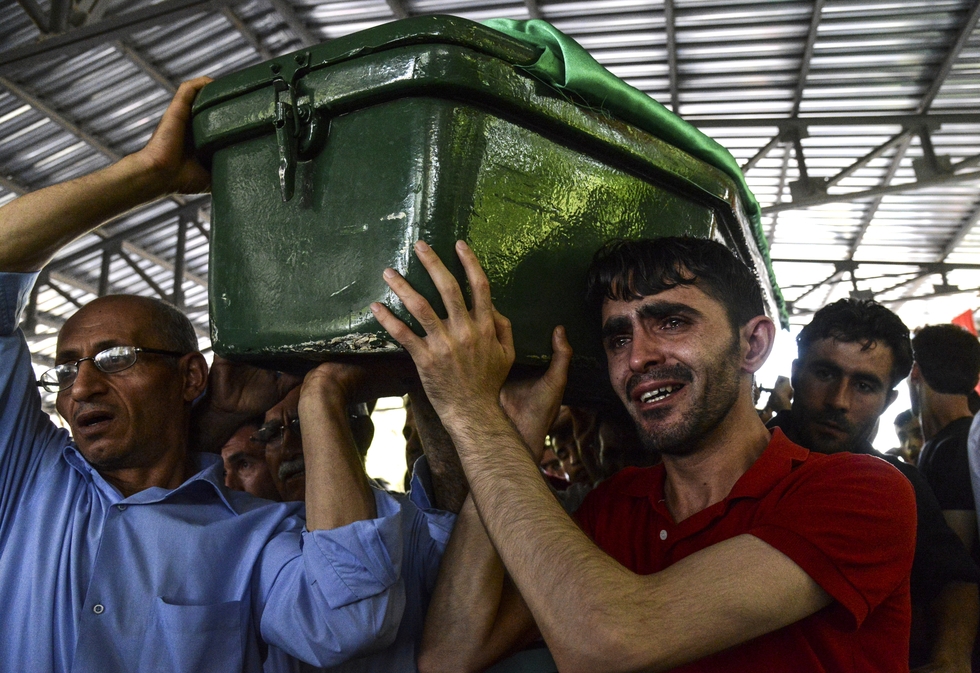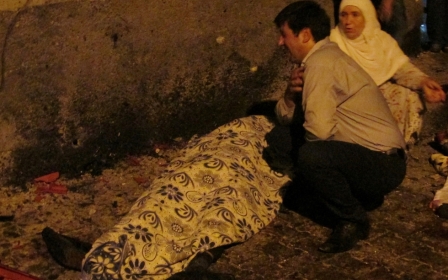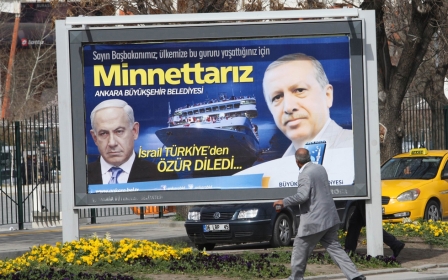Turkey seeks to identify child suicide bomber who killed 54 at Kurdish wedding

Turkish authorities were on Monday scrambling to ascertain the identity of a child suicide bomber acting on the orders of Islamic State (IS) who killed 54 people at a crowded Kurdish wedding.
President Recep Tayyip Erdogan said that the bomber who targeted the street wedding late on Saturday in the city of Gaziantep close to Syria was aged "between 12 and 14" and that initial findings showed it had been "perpetrated by Daesh (IS)".
Media said the majority of those dead were children or teenagers, with 29 of the 44 victims identified so far aged under 18. At least 22 victims were under 14, a Turkish official added.
"All of a sudden we heard and explosion and [body] parts and bones poured down on us," an eye-witness of the attack told the Guardian.
There were no further details on the bomber's identity, but Erdogan said IS had been trying to "position itself" in Gaziantep which lies just 60 kilometres north of Syria and is a major hub for refugees from the over five-year civil war.
Turkey's foreign minister, Mevlut Cavusoglu, told a press conference in Ankara on Monday that IS was targeting Turkey in revenge for Ankara cutting the flow of foreign fighters into the self-styled caliphate.
"Daesh is targeting us because we have cut their inflow of foreign fighters. We have 55,000 people on the no-entry list and have deported more than 4,000 suspected fighters from our ports of entry," he said, using an alternative name for the group.
Cavusoglu also said that Turkey's border region with Syria must be "completely cleansed" of IS operatives.
However, a spokesperson for the ruling AKP had claimed on Sunday that there was "no evidence" the attack was carried out by IS, suggesting instead that the outlawed pro-Kurdish PKK could have been behind the attack, which targeted a Kurdish wedding.
"We have no evidence that it was the work of Daesh. It could be them and it couldn't," AKP spokesperson Yasin Aktay told a press conference in Ankara on Sunday.
"Sometimes an incident which works in the PKK's favour is delegated to Daesh elements to carry out. There is no difference between the PKK and Daesh," he went on, going on to say that investigations into the group would uncover links to both the PKK and the opposition movement led by self-exiled cleric Fetullah Gulen, accused of orchestrating last month's failed military coup.
Aktay also said he was "saddened" by what he saw as attempts by the pro-Kurdish opposition HDP to "exploit" the bombing, and also suggested that the speed with which party officials arrived at the scene of the blast suggested they had been "prepared" for the bombing.
The attack apparently targeting the area's sizable Kurdish community has further stoken tensions and anger against the central government.
When AKP officials visited the site of the bombing on Sunday, assembled crowds were filmed shouting "Erdogan is a murderer," as well as "Long live Apo," a common nickname for PKK leader Abdullah Ocelan.
The Hurriyet daily said that DNA tests were under way to ascertain the identity, nationality and gender of the bomber.
It is possible that the bomber had come over the border from Syria, but IS is also known to have built homegrown cells inside Turkey in Gaziantep and even Istanbul, wrote its well-connected columnist Abdulkadir Selvi.
He said Turkish security forces believed that attack had been timed as retaliation by IS for offensives both by Kurdish militias and pro-Ankara Syrian opposition forces against IS in Syria.
"There's a fight against IS but we are paying the price," he wrote.
The leader of the pro-Kurdish Peoples' Democratic Party (HDP) Selahattin Demirtas said in a statement that "all of those killed were Kurds".
Deadliest attack this year
The bride and groom - a couple from the strongly Kurdish region of Siirt to the southeast - were rushed to hospital but not seriously wounded.
The attack followed a string of strikes blamed on IS and Kurdish militants in the last months but was the deadliest so far this year and first significant IS action in Turkey since the failed 15 July coup.
Hurriyet said the type of bomb used - stuffed with scraps of metal - was similar to the explosives used in previous suicide bombings against pro-Kurdish gatherings blamed on IS in the border town of Suruc and at Ankara train station last year.
All 44 victims identified so far were laid to rest in harrowing ceremonies in Gazinantep on Sunday with relatives throwing themselves on the coffins in desperation, an AFP correspondent said.
The hillside graveyard was pock-marked before the ceremony with the holes of dozens of freshly dug graves for the victims.
This article is available in French on Middle East Eye French edition.
Middle East Eye propose une couverture et une analyse indépendantes et incomparables du Moyen-Orient, de l’Afrique du Nord et d’autres régions du monde. Pour en savoir plus sur la reprise de ce contenu et les frais qui s’appliquent, veuillez remplir ce formulaire [en anglais]. Pour en savoir plus sur MEE, cliquez ici [en anglais].




